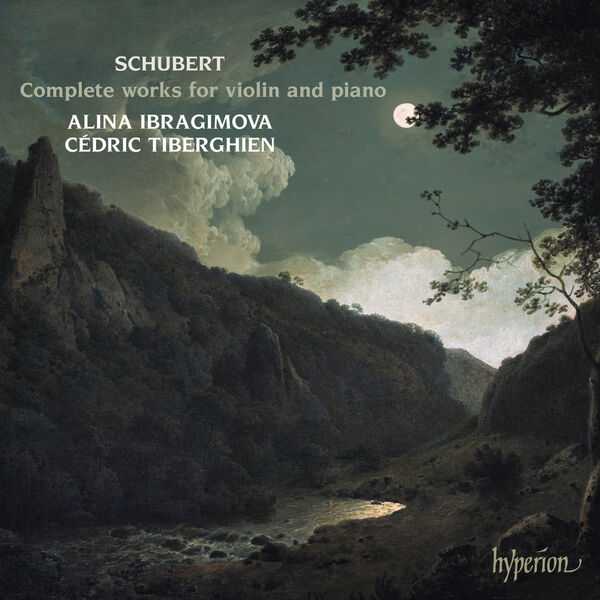

Composer: Franz Peter Schubert
Performer: Alina Ibragimova, Cédric Tiberghien
Number of Discs: 2
Format: FLAC (tracks)
Label: Hyperion
Catalogue: CDA67911-2
Release: 2013
Size: 1.91 GB
Recovery: +3%
Scan: yes
CD 01
Sonata (Sonatina) for violin & piano in D major, D384 (Op. posth. 137 No. 1)
01. I. Allegro molto
02. II. Andante
03. III. Allegro vivace
Sonata (Sonatina) for violin & piano in A minor, D385 (Op. posth. 137 No. 2)
04. I. Allegro moderato
05. II. Andante
06. III. Menuetto: Allegro
07. IV. Allegro
Sonatina (Sonatina) in G minor, D408 (Op. posth. 137 No. 3)
08. I. Allegro giusto
09. II. Andante
10. III. Menuetto
11. IV. Allegro moderato
CD 02
Grand Duo for Violin and Piano in A Major, D574
01. I. Allegro moderato
02. II. Scherzo: Presto
03. III. Andantino
04. IV. Allegro vivace
05. Rondo brillant in B minor, D895 (Op. 70)
Fantasie in C major for violin and piano, D934
06. I. Andante molto –
07. II. Allegretto –
08. III. Andantino –
09. IV. Tempo I – Allegro vivace
10. Sei mir gegrüsst! D741 (Rückert)
The luminous partnership of Alina Ibragimova and Cédric Tiberghien returns to Hyperion for this double album containing Schubert’s complete music for violin and piano. Their intelligence and technical prowess, their seamless and intimate connection as performers and their profound understanding of the music combine in magical performances.
While still in his teens, Schubert wrote four works for violin and piano that could have been given the label ‘sonata’, yet none of the four was published with that title. The first three, completed in 1816, bear instead the designation of ‘Sonatina’, perhaps to appeal to the amateur market. But these are highly accomplished works by the teenage composer and there is little ‘domestic’ feeling in the extended, mysterious unravellings of D385 which hint at compositions yet to come.
The later Violin Sonata in A major, D574 (now described as a ‘Duo’), urges the violinist on to greater virtuosic feats, and the Rondo in B minor even more so, with the piano sometimes treated as a surrogate orchestra. The extensive Fantasy in C major, written in the last year of Schubert’s life, is a masterpiece: the composer’s greatest achievement in this genre, which combines poignancy with sheer joy in life itself.
With the exception of the late Fantasy in C major, D. 934, Schubert’s works for violin and piano are little played. Most of them are early works; several were published as sonatinas, and they all were issued as pieces for piano with violin accompaniment in the Mozartian manner. They have the flavor of student works, but at times the Schubert of daring long-range harmonic organization pokes its head through. Violinist Alina Ibragimova and pianist Cédric Tiberghien deliver a low-key performance of the whole set that nicely matches the household ambiance in which these works would have been performed. They are alert to the characteristic Schubertian structures that lurk even in the three earliest sonatas, and they master subtle dynamics in building up the harmonic architecture of the Fantasy in C major. For an example of the pair at their best, sample the first movement of the Violin Sonata in A major, D. 574, where the emphasis shifts off between the violin and the piano’s left hand. There’s much that is worth hearing here, yet the recording leaves the listener frustrated at times. The Fantasy and the Rondo in B minor, D. 895, are true virtuoso pieces, among the few in Schubert’s catalog, but Ibragimova does not enter far into this aspect of it; her performances lack flair. And she does not really deliver a tune in a way that will leave you remembering it. There is material here for listeners, and other performers, to study, but the whole does not leave a consistently satisfying impression despite strong engineering from Hyperion in London’s Henry Wood Hall.